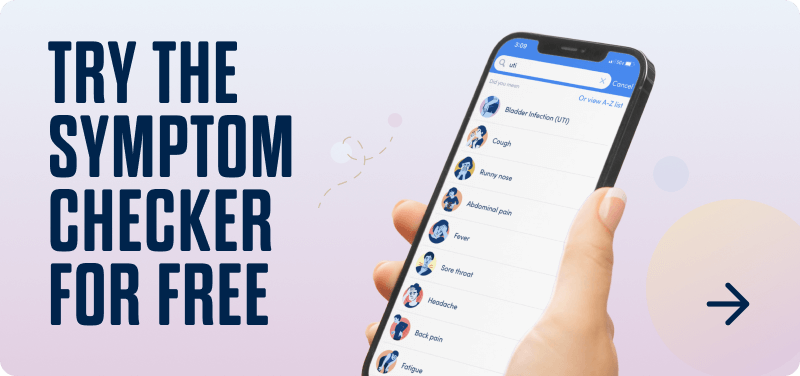GET A METFORMIN PRESCRIPTION ONLINE
Metformin (Glucophage®) is a medication that’s used to treat type 2 diabetes, polycystic ovary syndrome (PCOS), insulin resistance, and prediabetes, and can also be used for weight management.
With K Health, you can manage your condition from home and get the prescription medication you need.
-

GLP-1 medication if prescribed
-

Help interacting with your insurance
-

Personalized treatment and labs

Please note: Due to high demand, there are nationwide shortages of GLP-1 medications including Ozempic, Saxenda, and the starting doses of Wegovy. You may need to contact your local pharmacy to ask about availability.
How it works
We’re with you every step of the way

Personalized approach
Chat with your medical provider about your health goals and how we may be able to help you achieve them.

Medical weight management
Get labs done so your provider can customize a care plan for you and any chronic conditions you may have.

Focused on results
Your provider will adjust your care plan as needed to try to improve your weight, cholesterol, blood pressure, A1C, and other health markers.
Get treatment that’s right for you—we’ll help work with your insurance
Your doctor will work with you and your insurance provider to try to make your plan as affordable and sustainable as possible. That plan might look like*:
Get treatment that’s right for you—we’ll help work with your insurance
Your doctor will work with you and your insurance provider to try to make your plan as affordable and sustainable as possible. That plan might look like*:

Rick’s BMI and diabetes diagnosis mean he is more likely to get insurance approval for a GLP-1 medication.
Rick’s BMI and diabetes diagnosis mean he is more likely to get insurance approval for a GLP-1 medication.

Amber’s health insurance likely wouldn’t pay for a GLP-1 medication until she proved she had tried to manage her weight without it. After 3 months, if there were no clinical improvements, we would go back to the insurance company and ask for approval for the prescription.
Because Amber does not have type 2 diabetes, she would not be eligible for Ozempic, but could be for another GLP-1 medication.
Amber’s health insurance likely wouldn’t pay for a GLP-1 medication until she proved she had tried to manage her weight without it. After 3 months, if there were no clinical improvements, we would go back to the insurance company and ask for approval for the prescription.
Because Amber does not have type 2 diabetes, she would not be eligible for Ozempic, but could be for another GLP-1 medication.



“Ten weeks after starting to take semaglutide, I have more energy and just generally feel better. Importantly, I’m starting to see noticeable health benefits: Two weeks ago, I stopped having to use my sleep apnea mask.”
Dr. Heather Martin
Family medicine • K Health Medical Director • Receiving weight management treatment through K Health herself
*Results are not guaranteed and may vary. Side effects may occur.
For just $49 for your first month, you’ll also get:
Unlimited access to medical providers
Flexible appointments and anytime messaging
Easy prescription management for chronic conditions
24/7 Urgent Care for sudden medical needs
*Available for adults 18+ in all 48 continental US states. Not available in Alaska or Hawaii.
K Health memberships are not insurance and exclude ancillary services (e.g., labs, equipment, cost of medication, etc). Medical care is provided by K Health’s affiliated professional corporations. See Terms of Service.
Learn About Medical Weight Loss

What is online medical weight loss?
One in three Americans has obesity. Many want to do something about it but find it hard to make a lasting change. More than half of diets fail, often because those on them don’t have the right support.
With new medications targeting obesity and chronic conditions associated with obesity, this time could be different.
There are now ten prescription medications approved by the Food and Drug Administration (FDA) for weight loss and related ailments, six of which can be used long-term. (See more information about these medications below.) When taken as prescribed, in conjunction with diet and exercise modifications, and under the supervision of a doctor, the results can be life-changing.
Keep in mind that each prescription weight loss medication carries its own possible risks and benefits. This is why it’s important to speak with a healthcare provider about your medical history and health goals to see which medication may be right for you.
How does prescription weight loss work?
Each of the FDA-approved medications work in a slightly different way to support weight loss. Some may reduce your appetite while others may make it harder for your body to absorb fat from the foods that you eat.
It is important to note that these medications are not a replacement for exercise and a healthy diet. In fact, if you’re prescribed a weight-loss medication, your healthcare provider may recommend certain behavioral modifications, including a diet and exercise program, to help you reap the most benefits from the medication.
Everyone is different and it’s important to find the right healthcare provider, medication, and diet and exercise program for you.
Are weight loss medications right for me?
Most adults with health conditions associated with their weight are eligible for weight loss medication. These conditions include type 2 diabetes and high blood pressure, among others.
To be eligible for prescription weight loss medication, you must also meet a certain Body-Mass Index (BMI) threshold. If you don’t have a health condition associated with your weight, you must have a BMI of at least 30. If you do have a health condition associated with your weight, your BMI must be 27 or higher.
What are the side effects of weight loss medications?
The most common side effects of weight loss medication are upset stomach, nausea, bloating, constipation, diarrhea, vomiting, headache and fatigue. More serious side effects include thyroid tumors, including cancer, pancreatitis, gallbladder and kidney problems, and changes in mood.
How long do I have to take weight loss medications?
Some people take weight loss medications until they’ve lost as much weight as their physician recommends. A physician will likely prescribe the weight loss medication on an ongoing basis to help maintain weight loss. Some people will take weight loss medications as long as they are still experiencing weight loss with them. When the medication does not induce further weight loss, it is not recommended to continue using the medication. There is no typical amount of time for people to reach their goal weight.
Can I get weight loss medications without insurance?
Yes, you can access weight loss medications if you don’t have insurance.
How long does it take for weight loss medications to work?
Some patients start seeing results after the first few weeks of taking the medication, while others take longer. At K Health, success is gauged as losing 5% of body weight in 12 weeks.
A healthy weight leads to a healthier life
*Based on clinical studies published in Translational Behavioral Medicine, The Science of Diabetes Self-Management and Care, and the New England Journal of Medicine. Results may vary.
Frequently asked questions
What’s included in the K Health Medical Weight Management Program?
The K Health Medical Weight Management Program includes nearly everything K Health offers:
- Unlimited text-based visits with licensed medical providers
- 24/7 Urgent Care without an appointment
- Flexible appointments for chronic condition management
- Easy prescription management and renewals
- Treatment for anxiety and depression, including medication shipped to your door (medication cost not included)
- As always, no insurance needed, all on your own schedule
*24/7 Urgent Care is available in 48 states of the US. Not available in Alaska or Hawaii.
K Health memberships are not insurance and do not include any ancillary services, (e.g.) laboratory tests, durable medical equipment, appointments with other providers or specialists that we may refer you to, emergency or in-person urgent care facility visits; cost of medication and other referrals. Medical care is provided by K Health’s affiliated professional corporations. See Terms of Service.
How do GLP-1 receptor agonists work?
Each of the FDA-approved GLP-1 receptor agonist medications work in a slightly different way to support weight loss. Some may reduce your appetite while others may make it harder for your body to absorb fat from the foods that you eat.
It is important to note that these medications are not a replacement for exercise and a healthy diet. If you’re prescribed a weight-loss medication, clinicians will likely will recommend certain behavioral modifications, including a healthy eating and exercise program, to help you reap the most benefits from the medication, and manage or prevent any related chronic conditions.
Learn more about the side effects of Ozempic, Wegovy or Saxenda.
How do I know if weight loss medication is right for me?
Many adults with health conditions associated with their weight are eligible for weight loss medication. These conditions include type 2 diabetes and high blood pressure, among others.
To be eligible for prescription weight loss medication from clinicians practicing on the K Health platform, clinicians conduct a strict screening process, which includes ensuring a certain Body-Mass Index (BMI), the absence of certain medical conditions, and a history of unsuccessful weight loss with lifestyle modifications alone. If you don’t have a health condition associated with your weight, you must have a BMI of at least 30. If you do have a health condition associated with your weight, your BMI must be 27 or higher.
If someone isn’t a good fit for weight loss medication, they can still use K Health to manage other areas of their health, including lifestyle changes and chronic disease, mental health, and urgent care needs.
What are the side effects of GLP-1 medications?
The most common side effects of GLP-1 weight loss medications are upset stomach, nausea, bloating, constipation, diarrhea, vomiting, headache and fatigue. Typically, these symptoms are most severe in the first few weeks of taking medication and become milder or go away completely over time. Your clinician will set an appropriate dosing schedule to manage any side effects you may experience and can adjust your care plan as needed.
More serious side effects include thyroid tumors, including cancer, pancreatitis, gallbladder and kidney problems, and changes in mood. These reactions are rare, but if you experience any side effects that concern you, reach out to your clinician.
Learn more about the side effects of Ozempic, Wegovy or Saxenda.
What if my insurance won’t pay for my medication?
Your clinician and care team will work with you and your insurance provider to find the right care plan for you. Depending on your weight and other health conditions, you may be approved for a GLP-1 medication immediately, or your insurance may want to see you try other methods of weight loss first.
If that’s the case, your clinician can provide an alternate treatment as a first step and revisit your insurance authorization in a few months. In many cases, prior authorizations are approved the second time around.
Your clinician will never encourage you to take a medication that will not be affordable for you long-term by using a limited-time discount or similar method. We will work with you to ensure your care plan is affordable and sustainable.
Aren’t these medications just for diabetes? And isn’t there a shortage?
The GLP-1 medications semaglutide and liraglutide are FDA-approved for both type 2 diabetes and weight management under different brand names.
If appropriate, your clinician may prescribe you Wegovy (semaglutide) or Saxenda (liraglutide), which are both indicated for weight management, or another type of medication FDA-approved for weight management.
Your clinician may also prescribe metformin, a medication that helps to control blood sugar. While often used to treat type 2 diabetes, it can also be used to manage weight.
Because of high demand, there are currently supply shortages of Ozempic, Saxenda, and the lower doses of Wegovy. If you’re prescribed one of these medications, we recommend checking with your local pharmacy about their ability to fill your prescription. Your clinician can send your prescription to a different pharmacy if needed, or possibly provide an alternate treatment plan as a first step and revisit your GLP-1 prescription later.
What does the whole program cost?
Your K Health membership costs $49 for the first month* and is then billed in advance 3 months at a time (so you pay $147 every 3 months). Or, you can save $139 with a yearly plan and pay $449 for an annual membership. Either way, that membership includes:
- Unlimited text-based visits with licensed medical providers
- 24/7 Urgent Care without an appointment
- Flexible appointments for chronic condition management
- Easy prescription management and renewals
- Treatment for anxiety and depression, including medication shipped to your door (medication cost not included)
This membership does not include the cost of your medication or labs. If you are prescribed GLP-1 medication and your insurance agrees to cover it, it can cost as little as $20/month. The cost of labs can vary based on your insurance.
*24/7 Urgent Care is available in 48 states of the US. Not available in Alaska or Hawaii.
K Health memberships are not insurance and do not include any ancillary services, (e.g.) laboratory tests, durable medical equipment, appointments with other providers or specialists that we may refer you to, emergency or in-person urgent care facility visits; cost of medication and other referrals. Medical care is provided by K Health’s affiliated professional corporations. See Terms of Service.
Will my medical provider treat me for other health conditions I have?
Yes! Your medical provider will help you manage your whole health, including chronic conditions like diabetes, high blood pressure, high cholesterol, and more.
You’ll also be able to get 24/7 Urgent Care at no additional cost.
What if I already have a primary care doctor?
That’s totally fine. You’re welcome to use K Health for your Primary Care needs, but if you’d prefer to keep working with your current provider, you can still participate in our weight management program.
What is step therapy?
Step therapy is a type of prior authorization practiced by insurance providers. In step therapy, you begin treatment for a medical condition with the medication that’s considered “most preferred” (and is often less expensive) and progress to other therapies only if necessary.
What that means for you is that in many cases, your insurance will not cover the costs of GLP-1 medication unless you show that other methods of weight management haven’t worked for you. Your dedicated care team at K Health will help you navigate this process.
How is K Health’s Medical Weight Management Program different from other weight loss programs?
With K Health’s Medical Weight Management Program, you’ll work with a primary care physician to take care of your health holistically. They’ll help you manage most chronic health conditions and treat your weight as just one portion of your overall health.
What’s the difference in price between K Health and other weight loss programs?
While other online prescription weight management programs can cost over $100/month, K Health is the only place where you can get access to a primary care physician who will help you manage your whole health, including your weight, for just $49/month*.
*K Health memberships are not insurance and do not include any ancillary services, (e.g.) laboratory tests, durable medical equipment, appointments with other providers or specialists that we may refer you to, emergency or in-person urgent care facility visits; cost of medication and other referrals. Medical care is provided by K Health’s affiliated professional corporations. See Terms of Service.













